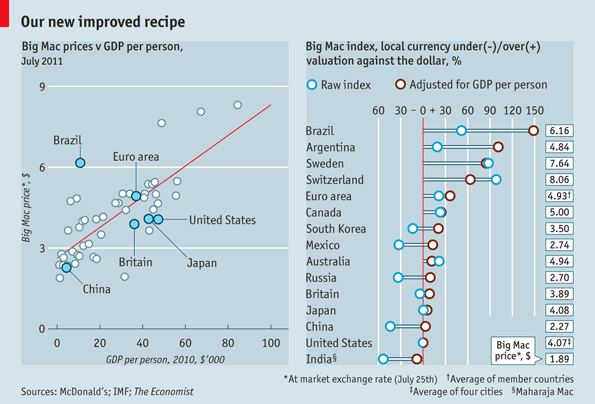The Economist updates their Big Mac Index, which as we all know, is the most accurate way to measure the global economy:
It is based on the theory of purchasing-power parity (PPP), the notion that in the long run exchange rates should move towards the rate that would equalise the prices of a basket of goods and services around the world. At market exchange rates, a burger is 44% cheaper in China than in America. In other words, the raw Big Mac index suggests that the yuan is 44% undervalued against the dollar. But we have long warned that cheap burgers in China do not prove that the yuan is massively undervalued. Average prices should be lower in poor countries than in rich ones because labour costs are lower. The chart above shows a strong positive relationship between the dollar price of a Big Mac and GDP per person.
When adjusted for GDP, we can see where Big Macs are actually expensive: Brazil, Argentina, and Sweden. I guess there’s a premium on special sauce over there.
[The Economist via kottke]


 Visualize This: The FlowingData Guide to Design, Visualization, and Statistics (2nd Edition)
Visualize This: The FlowingData Guide to Design, Visualization, and Statistics (2nd Edition)

China / developing countries: It would be interesting to compare to the GDP of urban areas, or 3rd tier city+ urban areas. I think about 70,000 Yuan per year, not huge, but some difference. Also, in China its common to see BigMacs sold at 12 Yuan (discounted), is the same true in other countries?
The Economist is famous for playing with words. I wonder if they intentionally called it “Raw Index” before adjusting for GDP. =)
Excellent article, does this theory extend to chicken nuggets etc. or is the Big Mac a special case?
I doubt if the theory extends because of the difference in menus across countries, but the Big Mac Index has been around for many years and The Economist gives it serious treatment.
I always feel stunned at ur inforgraphics, makes simple things look even more beautiful
just wondering what is the software to make this graphics?
Actually, Argentina burguer’s are more expensive than what you see here. Big Mac meal costs 4.84 but it’s not offered on the stores, it’s not on the menu. All other meals and the big mac’s replacement (triple mac) are about 50% more expensive than the big mac meal.
The government forced mcdonalds (secretly) to remove big mac from their offer to “cook” the big mac index and the inflation problem we are into.
In some emerging markets MickeyD is positioned to serve the wealthiest segments. You can get a bigmac in a wealthy suburb but it is unlikely you will find one in a middle or lower class neighborhood.